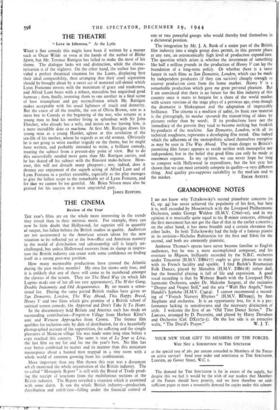GRAMOPHONE NOTES I DO not know why Tchaikowsky's second pianoforte
concerto (in G, op. 44) has never achieved the popularity of his first, but here it is, well recorded by Moseiwitsch w:th the Liverpool Philharmonic Orchestra, under George Weldon (H.M.V. C76o7-1o), and in my opinion it is musically quite equal to his B minor concerto, although the first movement has not got the élan of that in the earlier concerto ; on the other hand, it has more breadth and g certain elevation the other lacks. In both Tchaikowsky had the help of a famous pianist in its revision—Nicholas Rubinstein for the first and Siloti for the second, and both are eminently pianistic.
Ambrose Thomas's operas have never become familiar to English audiences, but he was a most accomplished composer, and his overture to Mignon, brilliantly recorded . by the N.B.C. orchestra under Toscanini (H.M.V2DB6177) ought to give pleasure to many with its French lucidity and sparkle. I find Barlok's Roumanian Folk Dances, played by Menuhin (H.M.V. DB6178) rather dull, but the beautiful playing is full of life and expression. A good vocal recording is that by Webster Booth with the Liverpool Phil- harmonic Orchestra, under Dr. Malcolm Sargent, of the recitative "Deeper and Deeper Still," and the aria "Waft Her Angels," from Handel's 7ephtha (H.M.V. C3414). I cannot recommend a record- ing of "French Nursery Rhymes" (H.M.V. BDi093), by Ann Stephens and orchestra. It is an opportunity lost, for it is a per- formance lacking in sensitiveness and the necessary distinction of style. I welcome the first of an 'Old Time Dance Series." The Lancers, arranged by D. Peccorini, and played by Harry Davidson and Orchestra (Col. DX1172-3). On the last side is an attractive


























 Previous page
Previous page